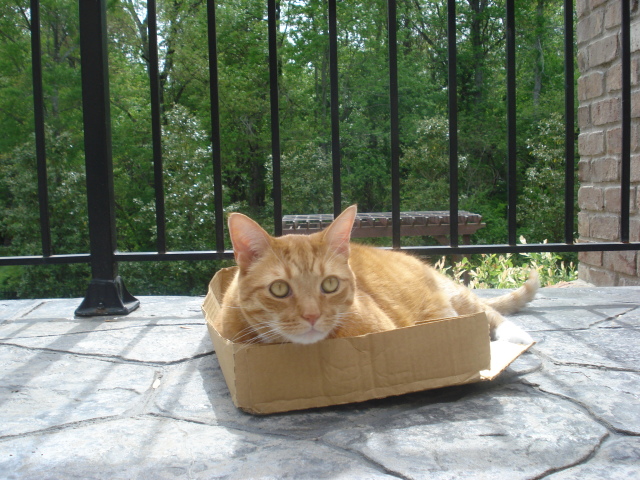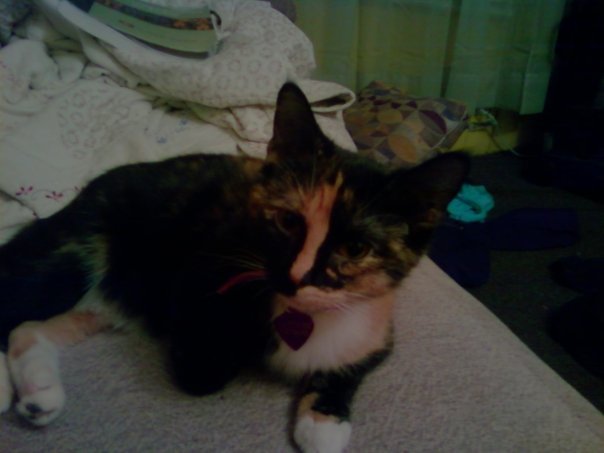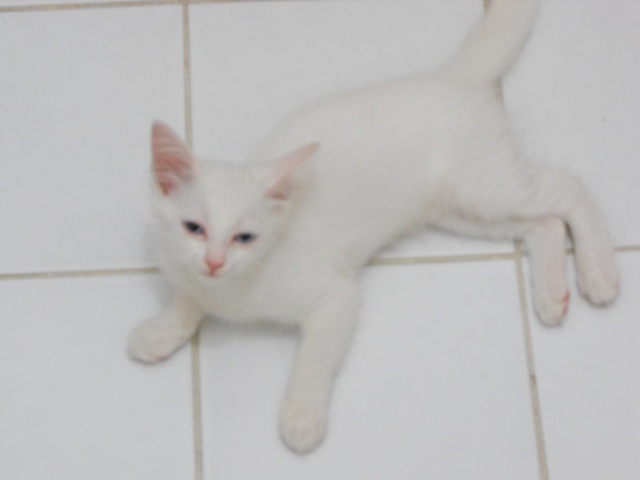QuestionMy cat has approximatly 1 week left of her pregnancy but hasn't
yet made a nest, i'm worried as we don't really have a quiet place
for her to have her litter,i would be very grateful for some
advice.
AnswerHi Kirstina. It is best to provide a place for her that's quiet and somewhat dimly lit, if possible. But she will likely find some place suitable for her kittens, even in a busy household.
Here's pretty much everything you'll need to know about delivery and raising the kittens.
I love seeing and helping kittens be born and raised more than anything else in life. Fortunately, cats usually make excellent mothers, so we are just there to sit back and enjoy!
I ALWAYS make it a point to be very involved with the births, but this is up to you. If you just want to let nature take its course, all you have to do is switch mama to a kitten food (over a week's time, to prevent upset stomach), and provide her with a birthing box. The best birthing boxes are made of cardboard boxes, big enough for the mother to stretch out in, but not TOO big. A box too big will not cause her to feel safe enough. Some people recommend to cut an entrance in the front. Personally, I find this undesirable, as the kittens can wander out. I always use a box with four sides, open on the top. It should be shallow enough for mama to get in and out of, even with her big belly (about 12"). Inside, there should be a few clean towels.
The box should be placed in the corner of a quiet room, or in a closet, as mama will want an area where there are not many disturbances. You can't guarantee she'll use the birthing box. Some cats choose to deliver in a laundry hamper, or on the bed, but most do find a birthing box suitable.
24-48 hours before delivery, sometimes a cat's body temperature will drop a couple degrees, usually to around 99 degrees (anything lower than this may be a medical emergency!). They may also lose appetite at this time, and may vomit. A cat can remain in preliminary labor, with mild contractions, for 48 hours.
Within a few hours of the first birth, you will probably notice some fluid and blood leaking from her vulva. She may spend time in the litter box pushing without producing stool and may spend time grooming her genital area. Some cats go into hiding. Others will become very clingy. You should also be able to see her sides harden with contractions, which will become more and more frequent. By this time, birth is very near, and most expectant mothers will purr, breathe rhythmically, and knead as a way to cope with the pain.
When birthing time comes, it's not uncommon for the cat to moan a bit or cry when delivering, especially if it's her first litter. A kitten should be produced within 45 minutes of heavy pushing. They can be born head first or feet first, about 50/50. A kitten is usually born every 15-45 minutes thereafter. The cat may go a couple hours between kittens, as long as she is not pushing heavily. If she is pushing heavily but does not produce a kitten within 45 minutes, she and the kittens are in danger of dying. Sometimes, a kitten may get stuck, and a c-section is necessary.
A cat may go out of heavy labor for several hours before delivery is finished. This is because a cat's uterus is divided into two horns. All kittens in one horn are usually delivered before the kittens in the other horn, and there can be a break in between. There should not be any contractions during this time. If labor and delivery have not resumed within 5 or 6 hours, again a vet is needed. Labor may need to be induced. However, complications are pretty rare, and things will probably go smoothly.
The kittens will be born in grayish sacs called amniotic sacs. Mama should break these open right away to get the kitten breathing. The kitten should begin squealing, and mama will probably lick him clean. This is important, because a wet kitten chills easily, and that can be deadly. She'll also chew the umbilical cord in half, and she may or may not eat the placenta. Once all the kittens are born and mama's nursing them, you should throw away any placentas she hasn't eaten. You also should prepare another box like the one she gave birth in, with clean towels. Wash your hands with hot water and antibacterial soap, and move the kittens and mama into the clean box. Throw away the old one.
If any of the kittens don't begin nursing within an hour of birth, you should help the kitten find a teat by gently nuzzling his nose against it. If he still doesn't start nursing, you'll need to hand nurse him. That's a lot of work and it can be heartbreaking, since many kittens are lost. I recommend to call a vet or animal shelter and see if there are volunteers who can hand nurse. If you want to do it yourself, there is a lot you'll need to know. I won't go into it here, but if you're interested, you can write back and I'll tell you how.
Personally, I am much more involved with the birth than I just went into. You can be, too! Just make sure your hands are sanitized prior to touching any of the kittens, and make sure they're warm.
As each kitten begins to emerge from the vagina, I gently cradle the body. Never pull on a head or tail. The kitten may come out a bit and then go back in, and that's okay. DON'T break the sac! Wait for the kitten to be half delivered, and then gently support the kitten. When mama pushes, you can very gently tug on the kitten's body to help move it along, but never pull between contractions.
I also break open the amniotic sacs with a clean cloth, rather than waiting for mama to do it. Sometimes, she won't "get it" when the first one's born. Dry the kitten off and place him at her belly for nursing. This will help the other kittens be born more quickly. After all the kittens are born and are dry and nursing, you can cut the umbilical cords if mama hasn't chewed them in half. Use a pair of sharp round-tipped scissors, disinfected with alcohol, to cut the cord no closer than 1" to the kitten's belly, and then throw away the placenta. Be sure not to pull on the umbilical cord, because if it's torn from the belly, infections or serious hernias could occur.
One thing you MUST do - handle the kittens each and every day! Most people believe that that will cause a mother to reject them. This is completely false. Don't take them out of mama's sight, but do pick them up, stroke them, and talk to them for a minute or two a few times a day, every day from birth. Just make sure you wash your hands well. It's so important to handle the kittens often. They begin to bond with people by the time they open their eyes at just 7-10 days old, and getting them familiar with your voice and scent even before then is a great idea. Responsible breeders handle kittens every day to ensure they grow to be excellent pets.
It's also important to weigh the kittens each and every day. The size at birth is not as important as the amount of weight they gain each day. You should measure their weight daily with a mail scale. They should gain 1/4-1/2 an ounce every day. If they don't gain for two days, or if they ever lose any weight at all, get them to the vet. This is a sign of Fading Kitten Syndrome (FKS). There are many, many possible causes of FKS. If caught early enough, many problems can be treated. But I must warn you that timing is imperative! Kittens can quickly die within 12 hours or shorter, if they stop eating. They aren't able to maintain blood sugar, which is why they need to eat at least every two hours.
Around 3-4 weeks, kittens usually start to be able to urinate on their own, and defecate shortly after. If you catch them urinating or defecating, place them in a shallow litter box with litter (but NOT clumping because this can cause gastrointestinal blockages in young kittens). I use a cookie sheet with a layer of litter at first, so they can get in and out. If you find solid accidents, move them into the litter tray so the kittens can see it.
Kittens can start experimenting with canned kitten food around 4 weeks old, and should be weaned by about 8 weeks. They may continue to nurse for another few weeks for bonding, but not really for nutrition. I personally don't recommend feeding kittens under 12 weeks any dry food, because they can choke.
These kittens will need their first vaccines by at 8-12 weeks old. Any younger than that may work against the antibodies kittens have gotten from mama's milk and leave the kittens completely unprotected. And mama should be spayed as soon as the vet confirms she is not lactating, which is usually about 10 days after the kittens have finished weaning completely.
Be sure to keep mama inside and away from unneutered males until she's sapyed. She can become pregnant again as soon as 48 hours after delivery, and that threatens the lives of her newborns, the fetuses, and her own.

 Im terrified... my cat may be dying
Question
My Edward
First of all I want to thank you for
Im terrified... my cat may be dying
Question
My Edward
First of all I want to thank you for
 Female Cat changes behavior
Question
Patches
I have four older cats, a dog and now
Female Cat changes behavior
Question
Patches
I have four older cats, a dog and now
 Kitten breed
Question
Minnoo
Dear Sir,
I brought home a female kitte
Kitten breed
Question
Minnoo
Dear Sir,
I brought home a female kitte
 Worried that my cat has a UTI??
Question
Oscar
Hello,
My name is Danielle and I have t
Worried that my cat has a UTI??
Question
Oscar
Hello,
My name is Danielle and I have t
 Killing Fleas on Persians
Question
Chloe Ruth
I simply cannot kill off the
Killing Fleas on Persians
Question
Chloe Ruth
I simply cannot kill off the